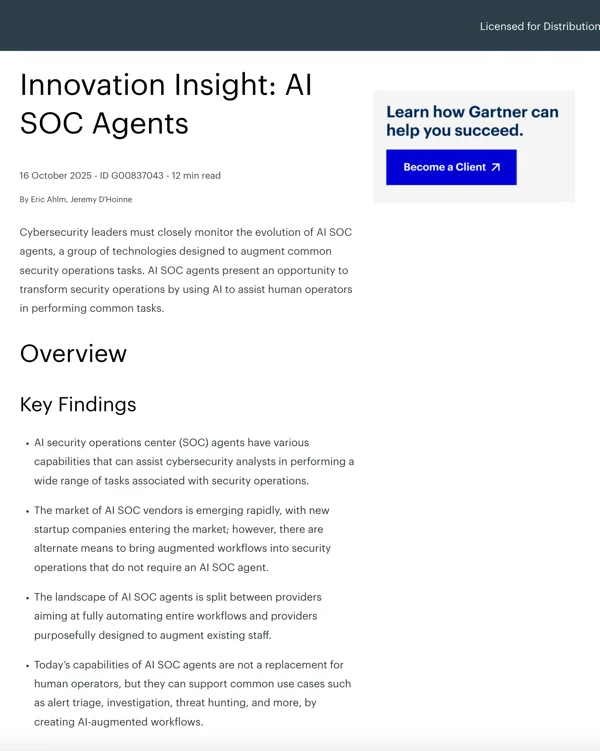
-min.webp)
AI and Machine Learning have been buzzwords for security practitioners for the better part of a decade. Unfortunately, their impact on cybersecurity has been mixed. It hasn’t made a significant dent in addressing the challenges faced by cybersecurity professionals — from detecting sophisticated attacks to managing a plethora of security tools.
However, the advent of large language models (LLMs) like GPT-4, Gemini, or Sonnet 3.5 has the potential to bring transformative changes across various industries, including cybersecurity. Is this the breakthrough that security practitioners have been waiting for? As companies adopt AI for cybersecurity, there is growing speculation about the future of cybersecurity jobs.
Will AI replace cybersecurity professionals, or will it create new opportunities within the field? This article explores the potential impact of AI on cybersecurity jobs, weighing the advantages and challenges of AI and examining the future landscape of the cybersecurity workforce.
AI has the potential to revolutionize the cybersecurity industry in several areas such as streamlining vendor risk management, enhancing threat detection, accelerating application security and automating security operations.
Vendor risk management: Filling out third-party risk management questionnaires is very time consuming. AI can drive significant efficiencies by auto-filling responses based on your existing data and processes.
Threat detection: AI can identify and respond to threats faster than human analysts. For instance, AI can detect malware, phishing attempts, and unusual network activity, providing real-time alerts to security teams. This capability significantly reduces the time it takes to detect and mitigate threats.
Application security: AI can turbo charge an enterprise’s “shift-left” strategy by scanning code to identify vulnerabilities and provide recommendations for remediation early in the process. It can also streamline software supply chain security by detecting and blocking risks in open source packages.
Security operations: AI-driven tools can assist in triage, investigation and response of security alerts. They can quickly enrich the alert with important context, analyze the evidence, provide a determination, and recommend appropriate remediation steps, enabling faster and more effective responses.
{{ebook-cta}}
There are several arguments supporting the notion that AI could replace some cybersecurity jobs:
Despite these compelling arguments, there are several reasons why AI is unlikely to completely replace cybersecurity professionals:
AI will undoubtedly transform the cybersecurity landscape, but it is unlikely to replace cybersecurity professionals entirely. Despite their potential, LLMs by themselves aren’t ready to tackle the above security challenges, whether it’s a chatbot or an agent. Instead, AI will change the nature of cybersecurity jobs and create new opportunities.
One area that LLMs can have an impact in the job market is in the 3.5 million unfilled cybersecurity job openings. By automating routine tasks and augmenting the capabilities of existing staff, AI can help bridge this talent gap. According to a study by Fortinet, 70% of organizations indicated that the skills shortage and unfilled jobs increases security risks for their organization.
Here are some key trends and predictions for the cybersecurity workforce:
AI is transforming the cybersecurity landscape, offering significant benefits in streamlining vendor risk management, enhancing threat detection, accelerating application security and automating security operations. However, AI is unlikely to replace cybersecurity jobs entirely. Instead, it will augment human capabilities, change the nature of existing roles, and create new opportunities.
Human expertise remains irreplaceable in cybersecurity, providing the intuition, creativity, and contextual understanding that AI lacks. The future of cybersecurity will involve hybrid teams of AI systems and human professionals working together to protect against increasingly sophisticated threats.
As AI continues to evolve, cybersecurity professionals must embrace continuous learning and adapt to new technologies and methodologies. By doing so, they can harness the power of AI to enhance their capabilities and ensure a secure digital future.
At Prophet Security, we're building an AI SOC Analyst that applies human-level reasoning and analysis to triage and investigate every alert, without the need for playbooks or complex integrations. Request a demo of Prophet AI to learn how you can triage and investigate security alerts 10 times faster.
Get Gartner's guidance on evaluating and adopting AI SOC agents

